Unit 5 Languages around the world Part 3 Discovering Useful Structures 课件 (31张PPT)
文档属性
| 名称 | Unit 5 Languages around the world Part 3 Discovering Useful Structures 课件 (31张PPT) | 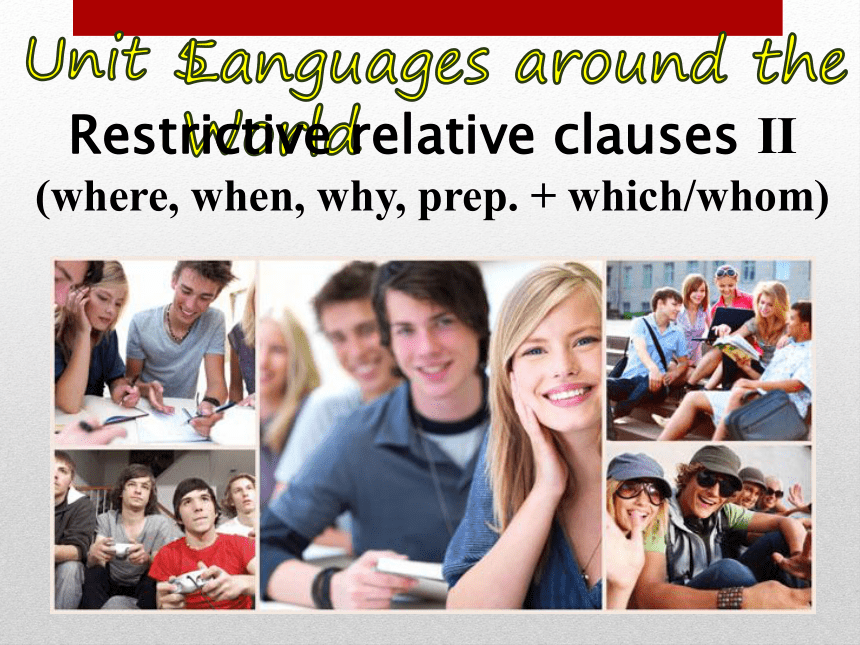 | |
| 格式 | zip | ||
| 文件大小 | 10.2MB | ||
| 资源类型 | 试卷 | ||
| 版本资源 | 人教版(2019) | ||
| 科目 | 英语 | ||
| 更新时间 | 2021-12-04 11:10:57 | ||
图片预览

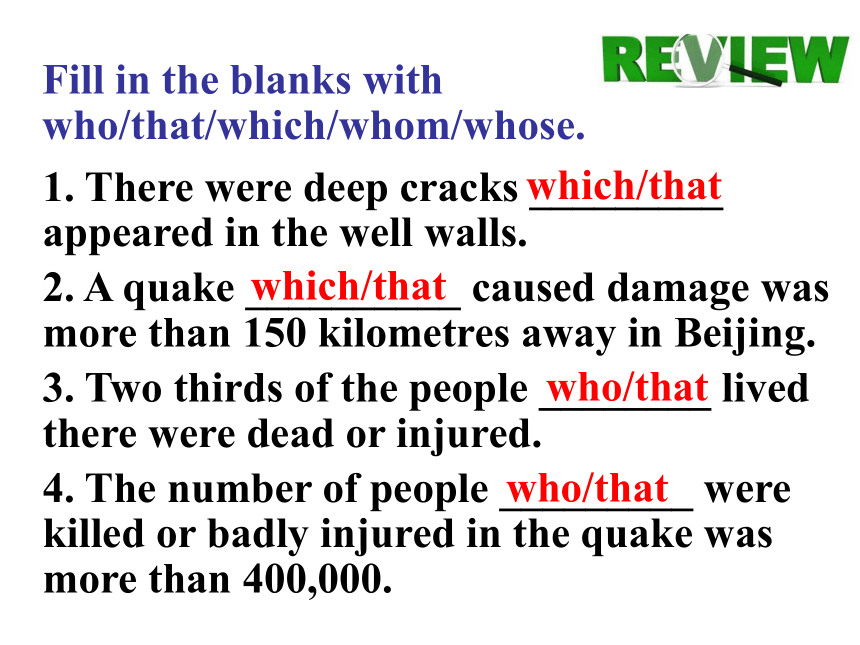
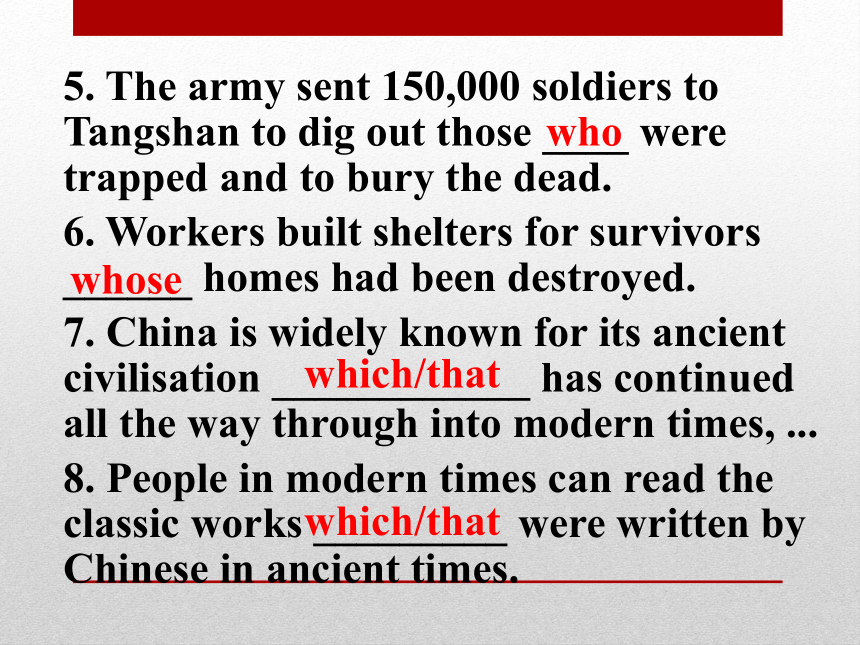
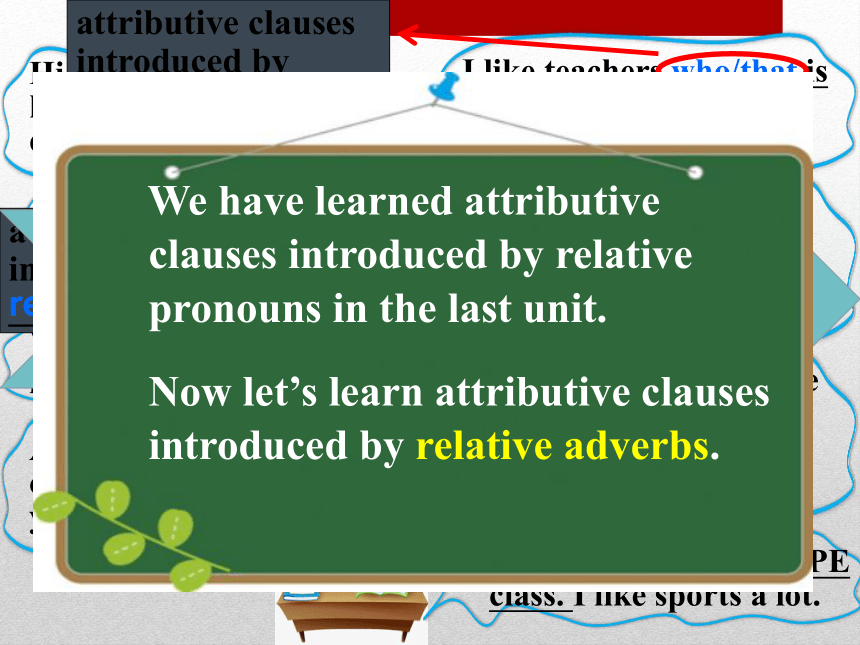
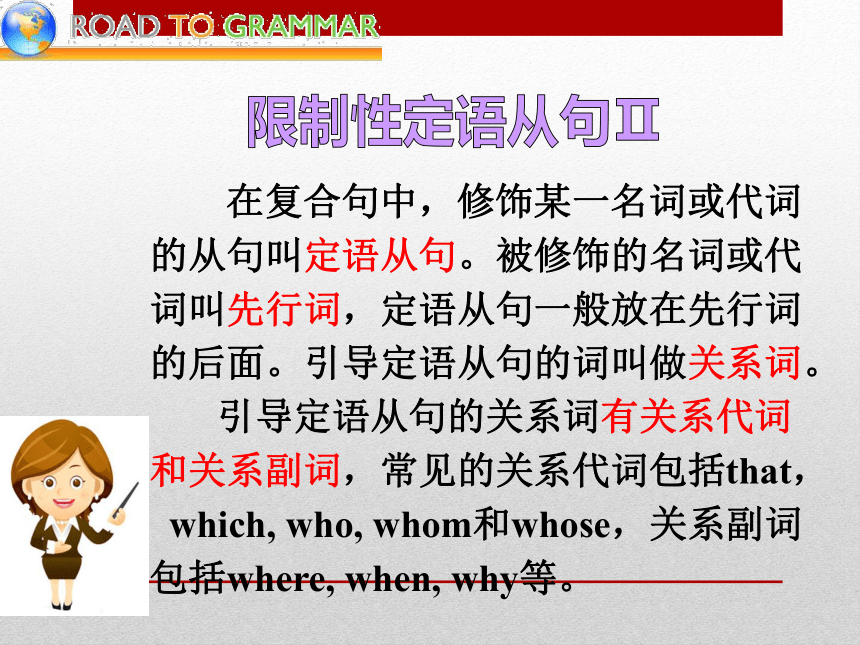
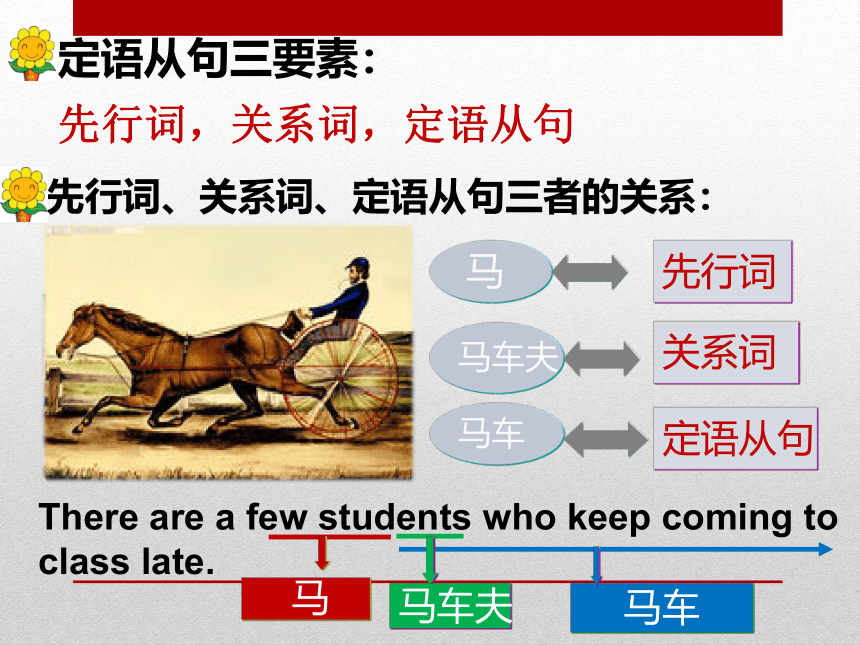
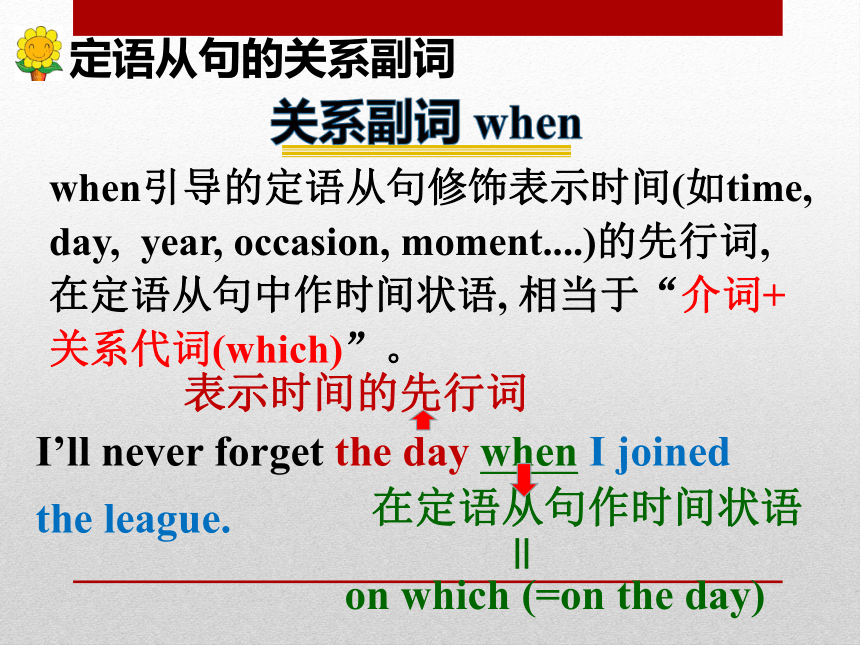
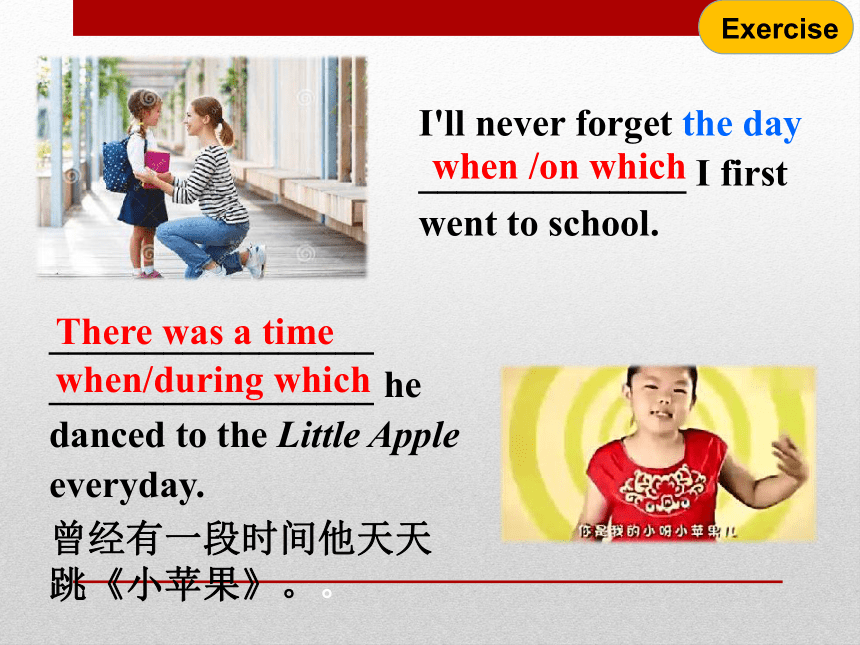
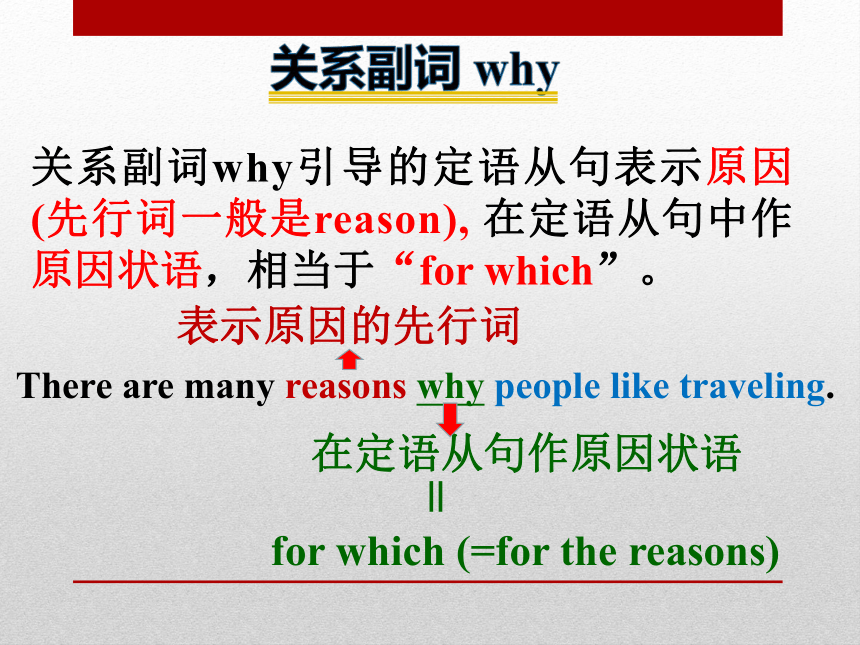
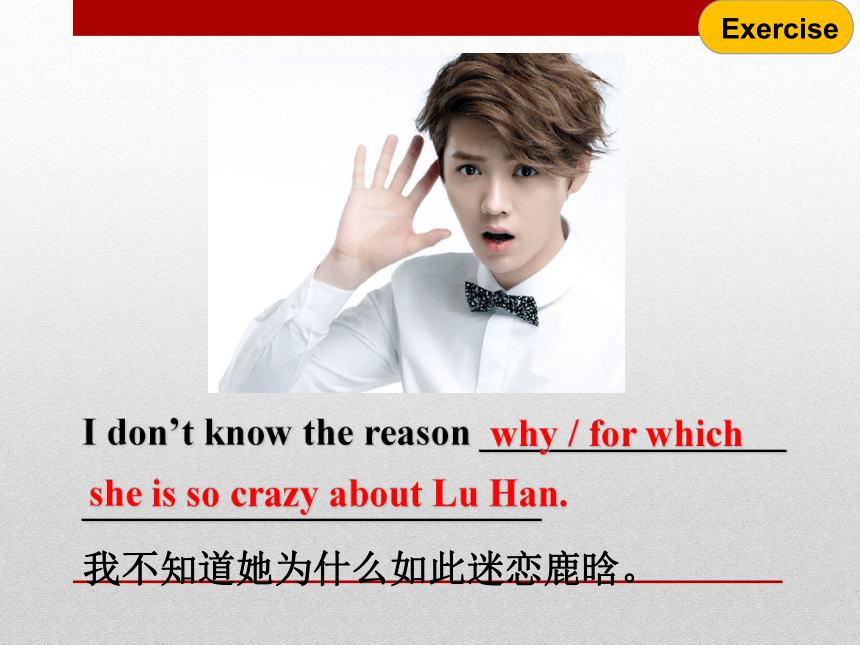
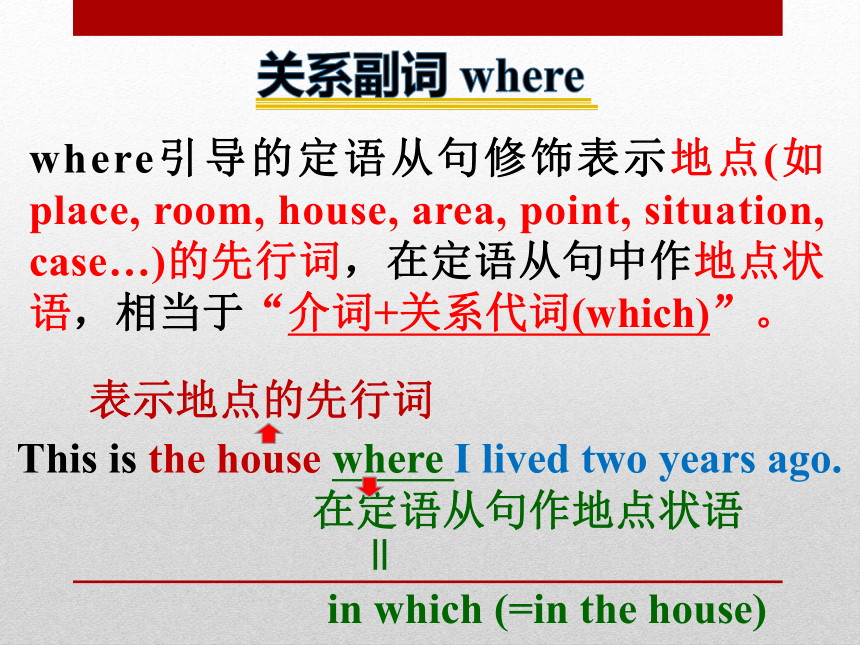
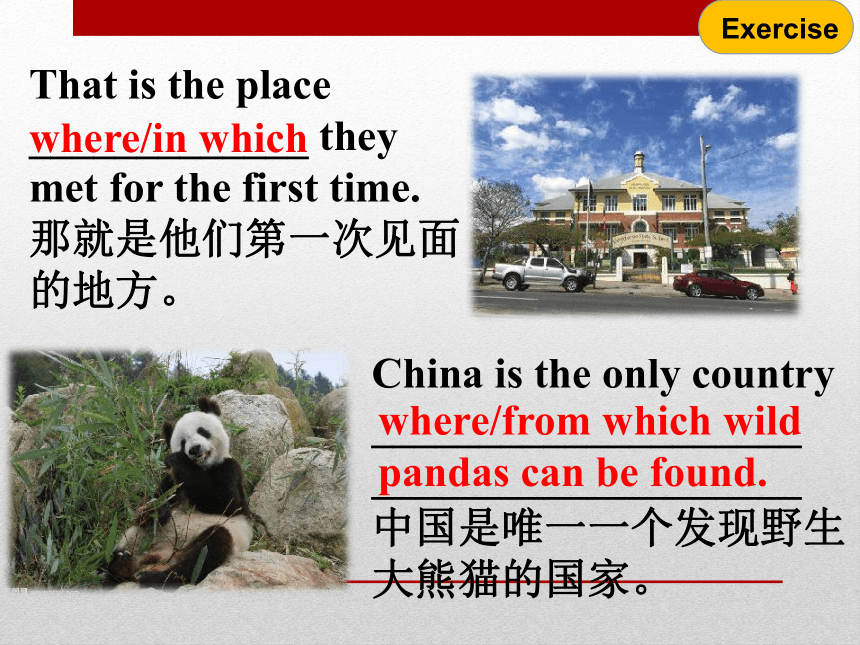
文档简介
(共31张PPT)
Restrictive relative clauses Ⅱ
(where, when, why, prep. + which/whom)
Fill in the blanks with who/that/which/whom/whose.
1. There were deep cracks _________ appeared in the well walls.
2. A quake __________ caused damage was more than 150 kilometres away in Beijing.
3. Two thirds of the people ________ lived there were dead or injured.
4. The number of people _________ were killed or badly injured in the quake was more than 400,000.
which/that
which/that
who/that
who/that
5. The army sent 150,000 soldiers to Tangshan to dig out those ____ were trapped and to bury the dead.
6. Workers built shelters for survivors ______ homes had been destroyed.
7. China is widely known for its ancient civilisation ____________ has continued all the way through into modern times, ...
8. People in modern times can read the classic works _________ were written by Chinese in ancient times.
which/that
which/that
who
whose
Hi, Jenny, what kind of teachers do you like best
I like teachers who/that is willing to help students patiently.
So who do you admire most
Miss Li, because she is always warm-hearted. That's the reason why I admire her most.
What's your favorite place at school
It's the library, because it is a place where I
can relax myself and enjoy books as well.
And what kind of day makes you happy
It's a day when we have PE class. I like sports a lot.
attributive clauses introduced by _________________
relative pronouns
attributive clause
introduced by _______________
relative adverbs
Mike is asking his deskmate Jenny about her favorite things of the school.
Observe the circled words.
We have learned attributive clauses introduced by relative pronouns in the last unit.
Now let’s learn attributive clauses introduced by relative adverbs.
在复合句中,修饰某一名词或代词的从句叫定语从句。被修饰的名词或代词叫先行词,定语从句一般放在先行词的后面。引导定语从句的词叫做关系词。
引导定语从句的关系词有关系代词和关系副词,常见的关系代词包括that, which, who, whom和whose,关系副词包括where, when, why等。
先行词
关系词
定语从句
定语从句三要素:
先行词,关系词,定语从句
There are a few students who keep coming to class late.
马
马车
马车夫
.先行词、关系词、定语从句三者的关系:
马
先行词
马车夫
关系词
马车
定语从句
when引导的定语从句修饰表示时间(如time, day, year, occasion, moment....)的先行词, 在定语从句中作时间状语, 相当于“介词+关系代词(which)”。
I’ll never forget the day when I joined the league.
表示时间的先行词
在定语从句作时间状语
=
on which (=on the day)
定语从句的关系副词
I'll never forget the day ______________ I first went to school.
when /on which
_________________
_________________ he danced to the Little Apple everyday.
There was a time when/during which
曾经有一段时间他天天跳《小苹果》。。
Exercise
There are many reasons why people like traveling.
表示原因的先行词
在定语从句作原因状语
关系副词why引导的定语从句表示原因(先行词一般是reason), 在定语从句中作原因状语,相当于“for which”。
=
for which (=for the reasons)
I don’t know the reason ________________
________________________
我不知道她为什么如此迷恋鹿晗。
why / for which she is so crazy about Lu Han.
Exercise
where引导的定语从句修饰表示地点(如place, room, house, area, point, situation, case…)的先行词,在定语从句中作地点状语,相当于“介词+关系代词(which)”。
This is the house where I lived two years ago.
表示地点的先行词
在定语从句作地点状语
=
in which (=in the house)
That is the place _____________ they met for the first time.
那就是他们第一次见面的地方。
where/in which
China is the only country
____________________
____________________
中国是唯一一个发现野生
大熊猫的国家。
where/from which wild pandas can be found.
Exercise
2. Emperor Qinshihuang united the seven major
states into one unified country where the Chinese
writing system began to develop in one direction.
Information: a location for an event.
小结 2
where 引导定语从句时,先行词为表示地点的名词,关系词在从句中作地点状语。
Emperor Qinshihuang united the seven major states into one unified country.
In that country the Chinese writing system began to develop in one direction.
where 还可用在表示抽象意义的地点名词后,如situation, stage, point, case, position, condition, activity, scene, occasion等,意思是“到了某种地步,在某种境况中” 。
The accident has reached to the point where both their parents are to be called in.
关系副词 Refer to examples
where
=in/at which The school where my son studies is beautiful.
when
=during\at/in/on which They’ll never forget July 1 on which Hong Kong returned to its motherland.
why
= for which There are many reasons for which people like traveling.
place
time
reason
注意:此时,介词的选择取决于其与先行词的搭配。
指时间,地点或原因的先行词在定语从句中:
作状语时,用关系副词when/where/why引导;
作主语或宾语时,用关系代词which或that引导。
关系副词与关系代词的区分
This is the reason ___________ I didn’t come.
The reason ________ she gave was not true.
why/for which
which/that
a. This is the place _______ he works.
This is the place ___________we visited last year.
b. That was the time ______ he arrived.
Do you still remember the time __________ we spent together
c. This is the reason ____________ he went.
The reason ___________ he gave us was quite reasonable.
where
which/that
when
that /which
why/for which
that /which
Exercise
很多情况下关系副词用“介词+which”来代替时, 其
介词由先行词或定语从句中谓语动词的形式来决定。
①I shall never forget those years when I lived with her.
= I shall never forget those years____________I lived with her.
②This is the house where I lived two years ago.
= This is the house __________ I lived two years ago.
③ A:The radio says that it will rain tomorrow.
B:This is the reason why we put off the match.
= This is the reason ________we put off the match.
during which
in which
for which
3.“介词+关系代词”之介词的选择
(1) 与从句中谓语动词的搭配相关
This is the book _____ which I spent 10 yuan.
This is the book _____ which I paid 10 yuan.
(2) 与先行词的搭配相关
I'll never forget the day _____ which I won the first prize in the
English contest.
(3) 与所表达的意义相关
The colorless gas _______ which we can not live is called oxygen.
on
for
on
without
关系代词前介词选择三原则
一先
二动
三意义
即根据先行词与介词的搭配关系选择
根据谓语动词与介词的搭配关系选择
即根据定语从句的意义来确定介词
注意:1.time用做先行词
注意2.
way 作为先行词时,且在定语从句中 充当状语时,其定语从句关系词可为: in which, that,
This is a good way in which the problem can be solved.
= This is a good way that the problem can be solved.
= This is a good way the problem can be solved.
注意3. “模糊地点”的先行词后跟where引导的定语从句,先行词可为point, situation, case,conditions, position, stage, scene, spot, activity, family, job
另,常见的“模糊时间”的先行词有occasion, stay, interval等,用when来引导定语从句。 (注意:此时关系词要在定语从句中充当状语)
The Internet, ______ we can search for a large amount of information, has become an indispensable part of many people’s life.
Social parties are the occasions _______ people can develop their interpersonal relationship.
where
when
用适当的关系词填空(一个)。
1. Do you still remember the first day ______ you went to
high school
2. I paid a visit to Fudan University _______ my father
studied thirty years ago.
3. Do you know the real reason ______ Anne didn't go to
the get-together
4. Tomorrow I will bring here the magazine for _______
you asked.
5. Peter put himself in a situation _______ he had to leave
the company.
6. There was a time ______ my daughter was crazy about
pop music.
7. The restaurant _______ I have eaten a wonderful meal
is going to close down.
8. There are two main reasons ______ this situation has
been allowed to continue.
when
where
why
which
where
when
where
why
1. This is our school ________ we study and make friends.
2.The most unforgettable school activity is the English speech contest, ______we had great fun.
3.We will put off the picnic in the park until next week, _______ the weather may be better.
4.There are many reasons ______ people learn a foreign language.
= in which
where
= in which
where
when
=in which
why
=for which
答案不止一个。
Look at these sentences and underline the restrictive relative clauses What kind of information does each clause communicate
1
1. It was a time when people were divided geographically.
2. Emperor Qinshihuang united the seven major states into one unified country where the Chinese writing system began to develop in one direction.
3.There are many reasons why this has been possible.
4. These are animals bones and shells on which symbols were carved by ancient Chinese people.
1. As it was a time when people were divided geographically.
2. Emperor Qinshihuang united the seven major states into one unified country where the Chinese writing system began to develop in one direction.
先行词为time,when在从句中做时间状语
先行词为country,where在从句中做地点状语
3.There are many reasons why this has been possible.
4. These are animals bones and shells
on which symbols were carved by ancient Chinese people.
先行词为reason,why在从句中做原因状语
先行词为animal bones and shells,on which 表示在从句中表示地点状语
Fill in the table to complete each phrase with a restrictive relative clause. Then use the phrases to make complete sentences.
2
P 64
1. the day when
the day when we spent time together
The day when we spent time together is gone.
2. the reason why
the reason why I was late for school
The teacher didn't believe the reason why I was late for school.
3. the place where
the place where we worked 10 years ago
The place where we worked 10 years ago is being rebuilt now.
4. the place/time in/at which
the place in which I have lived since childhood
This is the place in which I have lived since childhood.
I will never forget the time at which I lived in the country with my grandparents.
the time at which I lived in the country with my grandparents
Complete the passage with the correct relative adverbs or pronouns. Add a preposition where necessary.
P64 3
When I started studying German, it was a struggle. The words felt strange on my tongue, and the grammar would not stay in my head. I told my mum that I wanted to give up, and that I would never live in a country ______________ German was spoken. My mum told me that studying a language was not just for my future. It was exercise for the brain; the more I learnt of a language, the more my brain would grow. And I remember that day ______________ suddenly felt like German was no longer a foreign language. It felt like my brain had doubled in size. I had finally come to a place ______________ I could think in this foreign language, and I could see the world from a diferent point of view. I felt as if I had reached the goal __________ I had been fighting for. I could open a book and see meanings, not just a sea of words. I finally understood the reason ______ my mum had encouraged me not to give up. Thanks, Mum!
where/in which
when/on which
where/at which
which/that
why/for which
Restrictive relative clauses Ⅱ
(where, when, why, prep. + which/whom)
Fill in the blanks with who/that/which/whom/whose.
1. There were deep cracks _________ appeared in the well walls.
2. A quake __________ caused damage was more than 150 kilometres away in Beijing.
3. Two thirds of the people ________ lived there were dead or injured.
4. The number of people _________ were killed or badly injured in the quake was more than 400,000.
which/that
which/that
who/that
who/that
5. The army sent 150,000 soldiers to Tangshan to dig out those ____ were trapped and to bury the dead.
6. Workers built shelters for survivors ______ homes had been destroyed.
7. China is widely known for its ancient civilisation ____________ has continued all the way through into modern times, ...
8. People in modern times can read the classic works _________ were written by Chinese in ancient times.
which/that
which/that
who
whose
Hi, Jenny, what kind of teachers do you like best
I like teachers who/that is willing to help students patiently.
So who do you admire most
Miss Li, because she is always warm-hearted. That's the reason why I admire her most.
What's your favorite place at school
It's the library, because it is a place where I
can relax myself and enjoy books as well.
And what kind of day makes you happy
It's a day when we have PE class. I like sports a lot.
attributive clauses introduced by _________________
relative pronouns
attributive clause
introduced by _______________
relative adverbs
Mike is asking his deskmate Jenny about her favorite things of the school.
Observe the circled words.
We have learned attributive clauses introduced by relative pronouns in the last unit.
Now let’s learn attributive clauses introduced by relative adverbs.
在复合句中,修饰某一名词或代词的从句叫定语从句。被修饰的名词或代词叫先行词,定语从句一般放在先行词的后面。引导定语从句的词叫做关系词。
引导定语从句的关系词有关系代词和关系副词,常见的关系代词包括that, which, who, whom和whose,关系副词包括where, when, why等。
先行词
关系词
定语从句
定语从句三要素:
先行词,关系词,定语从句
There are a few students who keep coming to class late.
马
马车
马车夫
.先行词、关系词、定语从句三者的关系:
马
先行词
马车夫
关系词
马车
定语从句
when引导的定语从句修饰表示时间(如time, day, year, occasion, moment....)的先行词, 在定语从句中作时间状语, 相当于“介词+关系代词(which)”。
I’ll never forget the day when I joined the league.
表示时间的先行词
在定语从句作时间状语
=
on which (=on the day)
定语从句的关系副词
I'll never forget the day ______________ I first went to school.
when /on which
_________________
_________________ he danced to the Little Apple everyday.
There was a time when/during which
曾经有一段时间他天天跳《小苹果》。。
Exercise
There are many reasons why people like traveling.
表示原因的先行词
在定语从句作原因状语
关系副词why引导的定语从句表示原因(先行词一般是reason), 在定语从句中作原因状语,相当于“for which”。
=
for which (=for the reasons)
I don’t know the reason ________________
________________________
我不知道她为什么如此迷恋鹿晗。
why / for which she is so crazy about Lu Han.
Exercise
where引导的定语从句修饰表示地点(如place, room, house, area, point, situation, case…)的先行词,在定语从句中作地点状语,相当于“介词+关系代词(which)”。
This is the house where I lived two years ago.
表示地点的先行词
在定语从句作地点状语
=
in which (=in the house)
That is the place _____________ they met for the first time.
那就是他们第一次见面的地方。
where/in which
China is the only country
____________________
____________________
中国是唯一一个发现野生
大熊猫的国家。
where/from which wild pandas can be found.
Exercise
2. Emperor Qinshihuang united the seven major
states into one unified country where the Chinese
writing system began to develop in one direction.
Information: a location for an event.
小结 2
where 引导定语从句时,先行词为表示地点的名词,关系词在从句中作地点状语。
Emperor Qinshihuang united the seven major states into one unified country.
In that country the Chinese writing system began to develop in one direction.
where 还可用在表示抽象意义的地点名词后,如situation, stage, point, case, position, condition, activity, scene, occasion等,意思是“到了某种地步,在某种境况中” 。
The accident has reached to the point where both their parents are to be called in.
关系副词 Refer to examples
where
=in/at which The school where my son studies is beautiful.
when
=during\at/in/on which They’ll never forget July 1 on which Hong Kong returned to its motherland.
why
= for which There are many reasons for which people like traveling.
place
time
reason
注意:此时,介词的选择取决于其与先行词的搭配。
指时间,地点或原因的先行词在定语从句中:
作状语时,用关系副词when/where/why引导;
作主语或宾语时,用关系代词which或that引导。
关系副词与关系代词的区分
This is the reason ___________ I didn’t come.
The reason ________ she gave was not true.
why/for which
which/that
a. This is the place _______ he works.
This is the place ___________we visited last year.
b. That was the time ______ he arrived.
Do you still remember the time __________ we spent together
c. This is the reason ____________ he went.
The reason ___________ he gave us was quite reasonable.
where
which/that
when
that /which
why/for which
that /which
Exercise
很多情况下关系副词用“介词+which”来代替时, 其
介词由先行词或定语从句中谓语动词的形式来决定。
①I shall never forget those years when I lived with her.
= I shall never forget those years____________I lived with her.
②This is the house where I lived two years ago.
= This is the house __________ I lived two years ago.
③ A:The radio says that it will rain tomorrow.
B:This is the reason why we put off the match.
= This is the reason ________we put off the match.
during which
in which
for which
3.“介词+关系代词”之介词的选择
(1) 与从句中谓语动词的搭配相关
This is the book _____ which I spent 10 yuan.
This is the book _____ which I paid 10 yuan.
(2) 与先行词的搭配相关
I'll never forget the day _____ which I won the first prize in the
English contest.
(3) 与所表达的意义相关
The colorless gas _______ which we can not live is called oxygen.
on
for
on
without
关系代词前介词选择三原则
一先
二动
三意义
即根据先行词与介词的搭配关系选择
根据谓语动词与介词的搭配关系选择
即根据定语从句的意义来确定介词
注意:1.time用做先行词
注意2.
way 作为先行词时,且在定语从句中 充当状语时,其定语从句关系词可为: in which, that,
This is a good way in which the problem can be solved.
= This is a good way that the problem can be solved.
= This is a good way the problem can be solved.
注意3. “模糊地点”的先行词后跟where引导的定语从句,先行词可为point, situation, case,conditions, position, stage, scene, spot, activity, family, job
另,常见的“模糊时间”的先行词有occasion, stay, interval等,用when来引导定语从句。 (注意:此时关系词要在定语从句中充当状语)
The Internet, ______ we can search for a large amount of information, has become an indispensable part of many people’s life.
Social parties are the occasions _______ people can develop their interpersonal relationship.
where
when
用适当的关系词填空(一个)。
1. Do you still remember the first day ______ you went to
high school
2. I paid a visit to Fudan University _______ my father
studied thirty years ago.
3. Do you know the real reason ______ Anne didn't go to
the get-together
4. Tomorrow I will bring here the magazine for _______
you asked.
5. Peter put himself in a situation _______ he had to leave
the company.
6. There was a time ______ my daughter was crazy about
pop music.
7. The restaurant _______ I have eaten a wonderful meal
is going to close down.
8. There are two main reasons ______ this situation has
been allowed to continue.
when
where
why
which
where
when
where
why
1. This is our school ________ we study and make friends.
2.The most unforgettable school activity is the English speech contest, ______we had great fun.
3.We will put off the picnic in the park until next week, _______ the weather may be better.
4.There are many reasons ______ people learn a foreign language.
= in which
where
= in which
where
when
=in which
why
=for which
答案不止一个。
Look at these sentences and underline the restrictive relative clauses What kind of information does each clause communicate
1
1. It was a time when people were divided geographically.
2. Emperor Qinshihuang united the seven major states into one unified country where the Chinese writing system began to develop in one direction.
3.There are many reasons why this has been possible.
4. These are animals bones and shells on which symbols were carved by ancient Chinese people.
1. As it was a time when people were divided geographically.
2. Emperor Qinshihuang united the seven major states into one unified country where the Chinese writing system began to develop in one direction.
先行词为time,when在从句中做时间状语
先行词为country,where在从句中做地点状语
3.There are many reasons why this has been possible.
4. These are animals bones and shells
on which symbols were carved by ancient Chinese people.
先行词为reason,why在从句中做原因状语
先行词为animal bones and shells,on which 表示在从句中表示地点状语
Fill in the table to complete each phrase with a restrictive relative clause. Then use the phrases to make complete sentences.
2
P 64
1. the day when
the day when we spent time together
The day when we spent time together is gone.
2. the reason why
the reason why I was late for school
The teacher didn't believe the reason why I was late for school.
3. the place where
the place where we worked 10 years ago
The place where we worked 10 years ago is being rebuilt now.
4. the place/time in/at which
the place in which I have lived since childhood
This is the place in which I have lived since childhood.
I will never forget the time at which I lived in the country with my grandparents.
the time at which I lived in the country with my grandparents
Complete the passage with the correct relative adverbs or pronouns. Add a preposition where necessary.
P64 3
When I started studying German, it was a struggle. The words felt strange on my tongue, and the grammar would not stay in my head. I told my mum that I wanted to give up, and that I would never live in a country ______________ German was spoken. My mum told me that studying a language was not just for my future. It was exercise for the brain; the more I learnt of a language, the more my brain would grow. And I remember that day ______________ suddenly felt like German was no longer a foreign language. It felt like my brain had doubled in size. I had finally come to a place ______________ I could think in this foreign language, and I could see the world from a diferent point of view. I felt as if I had reached the goal __________ I had been fighting for. I could open a book and see meanings, not just a sea of words. I finally understood the reason ______ my mum had encouraged me not to give up. Thanks, Mum!
where/in which
when/on which
where/at which
which/that
why/for which
